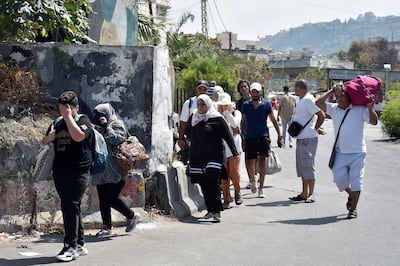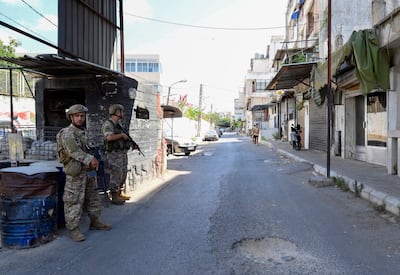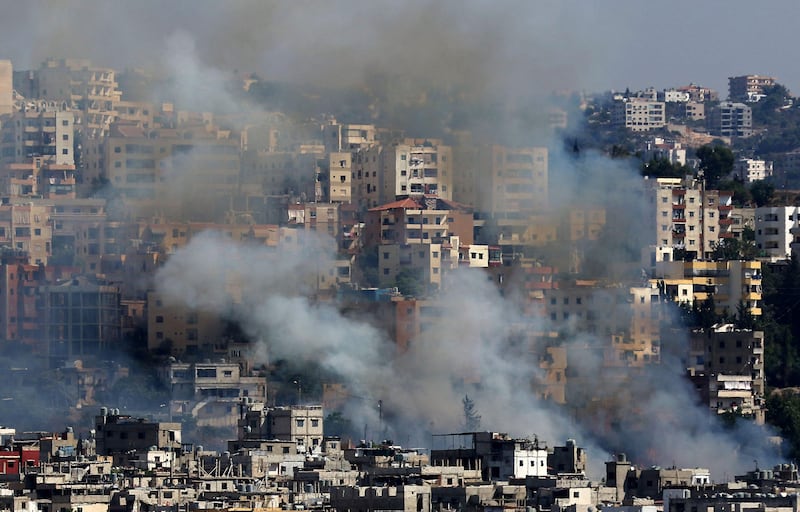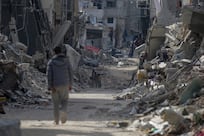Fierce clashes between Palestinian factions and armed extremists in Ain Al Hilweh, Lebanon’s largest refugee camp for Palestinians, continued for a fourth day on Monday, despite continuing ceasefire attempts on both sides.
The Ain Al Hilweh conflict in Sidon has claimed seven lives and left at least 72 people injured since it reignited last week, according to Hamshari Hospital director Dr Riad Abu Al Einen.
At least one of those killed was a civilian, who was hit by a stray bullet in the nearby village of Ghazzieh.
More than 2,000 people have been displaced since Thursday, said Mohammad Safadi, a co-ordinator at the Musalli Mosque near Ain Al Hilweh – the central gathering point for camp residents forced out by the conflict.
“Right now, I have between 600 and 700 people staying here and we’re working on finding them accommodation in mosques and schools around the city,” he told The National.
Despite the announcement of an overnight ceasefire, by Monday morning the sound of machineguns and rocket-propelled grenades resumed echoing throughout a desolate Saida city, which hosts the Ain Al Hilweh camp.

Acting head of the national general security agency, Maj Gen Elias Al Bisari, said the conflict could destabilise Lebanon's sovereignty.
“What is happening is very dangerous and if it expands, it will turn into an exhausting crisis. And Lebanon does not lack crises," he said in a statement.
"Palestinian weapons are being used inappropriately and are threatening internal stability, and Palestinians are being displaced and killed."
Army intervention threat
The conflict has threatened to spill into the city. On Sunday, five Lebanese soldiers were injured in the shelling of army unit positions near the camp.
In a statement, the Lebanese army warned concerned parties of “the consequences of exposing military positions and personnel to danger” and threatened that “appropriate measures” would be taken in response.
Fighting between Islamist extremist groups and the Fatah movement – the dominant faction in Ain Al Hilweh and the party of Palestinian Authority President Mahmoud Abbas – resumed last week after a month of tense calm.
Fatah and allied factions had promised forceful retribution against extremist parties – among them the Al Qaeda-affiliated Jund Al Sham – if they did not surrender the suspected killers of Abu Ashraf Al Armoushi, a high-profile Fatah military commander assassinated in late July.
The killing ignited fierce clashes between Palestinian factions, led by Fatah, and groups of armed Islamist extremists.
Those clashes, which ended early last month, resulted in 13 dead and at least 2,000 people displaced.
The powerful Palestinian party had given a late August deadline to surrender the killers, but the deadline passed with no one being handed over.
A Lebanese army source told The National the military was negotiating a ceasefire with rival camp factions, acknowledging the difficulty of achieving a truce that does not crumble overnight.

“As of now we’re not interfering inside and we’re taking the diplomacy route,” the source said. “It’s an internal dispute. If we go in, it could cause a big problem.”
The source added that military interference in the camp would be contingent on the decision of Lebanese leaders.
The Lebanese state leaves residents to handle security in Palestinian refugee camps due to a decades-old agreement that, for the most part, prevents the military from entering the sites.
But the Lebanese military does intervene in rare cases. In 2007 the Lebanese army fought a 15-week war against radical Islamist factions in the northern Nahr Al Bared refugee camp, which was destroyed, with thousands displaced.
Ain Al Hilweh is home to more than 50,000 registered Palestinian refugees, as well as to a number of the 30,000 Palestinian refugees displaced from Nahr Al Bared camp.







